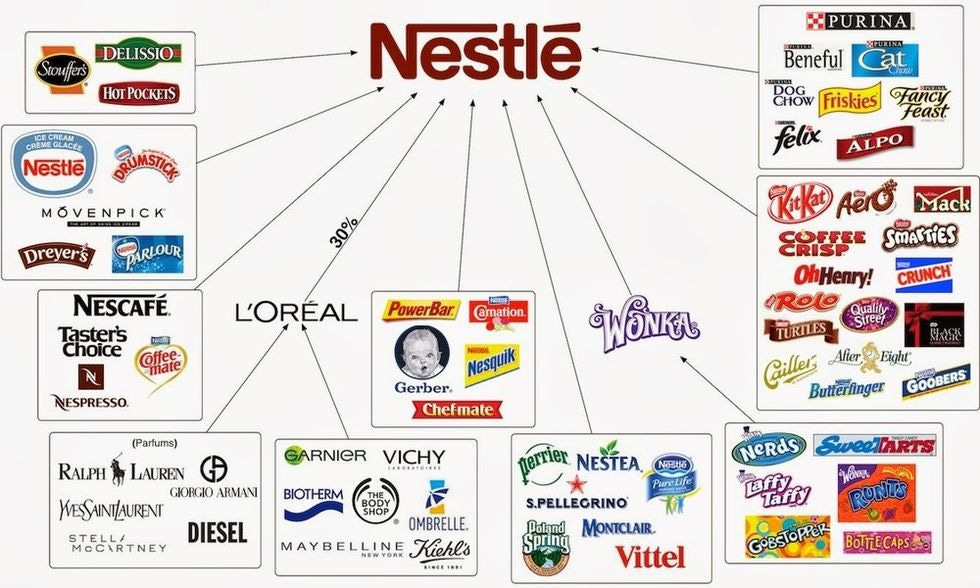Happy Halloween! Your Chocolate Is Probably Harvested By Child Slaves
There are over 1.6 million children working in the cocoa industry.
Allow me to preface this by saying that there really isn't any ethical consumption under capitalism, at least not entirely, and at least capitalism the way it's practiced here and also everywhere else. Just do your best.
Back in 2001, Hershey, Nestlé, and Mars signed an agreement promising to eradicate child labor in the chocolate industry by the year 2005. That, as you may have guessed, did not exactly pan out. Then they were supposed to eradicate it by 2008. Then 2010. None of those really panned out either.
And now, according to a report from the Department of Labor, the child labor problem in the chocolate industry in West Africa has actually gotten much worse.
The country-specific data indicates that in cocoa growing areas 38 percent of children in Côte d'Ivoire and 55 percent of children in Ghana living in agricultural households were engaged in child labor in cocoa production. Amid a 14 percent increase in cocoa production between 2013/14 and 2018/19 in Côte d'Ivoire and Ghana in aggregate, prevalence of child labor in cocoa production among cocoa growing households in each individual country remained stable.
Amid a 62 percent increase in cocoa production between 2008/09 and 2018/19 in Côte d'Ivoire and Ghana in aggregate, prevalence of child labor in cocoa production among all agricultural households increased 14 percentage points.
This report, by the way, only counts child laborers — the ones who are actually paid. It does not count the ones who aren't. We differentiate between "child labor" and "forced child labor" — i.e., slavery — but it's pretty unlikely that any children are out there harvesting cocoa beans or working in the garment industry because it's what they actually want to be doing. So it's really all child slavery, when you think about it.
Part of the problem is that most of these companies do not exactly know where most of their chocolate comes from, which means they cannot guarantee that they did not come from sources that use child labor. And given that there are 1.6 million children working in this industry, it's pretty clear that cocoa is going somewhere . They've had 20 years to figure this out, and yet it still remains a mystery. Still, none of the major chocolate sellers know where a majority of their chocolate comes from.
The way it works, generally, is that farmers sell to local traders, who then sell to exporters who then sell to international traders who then sell the cocoa to cocoa processing companies who then sell it to the chocolate manufacturers. Mars claims it knows where 24 to 40 percent of its cocoa comes from, Hershey's less than half, Nestlé 46 percent. Godiva's would not disclose.
But if the US Department of Labor can figure out how many of these kids are working in the cocoa industry, there has to be a way to figure out where the cocoa is going. Or to just buy from the sources they know are legit. How hard would it be for them to say, "Hey, show us where you got this chocolate or we will not give you money for this chocolate"?
Back in 2019, Antonie Fountain, an advocate against child labor, told the Washington Post that perhaps these companies could manage to figure this whole thing out if there were some consequences for their actions.
"The companies have always done just enough so that if there were any media attention, they could say, 'Hey guys, this is what we're doing,' " said Antonie Fountain, managing director of the Voice Network, an umbrella group seeking to end child labor in the cocoa industry. "It's always been too little, too late. It still is."
"We haven't eradicated child labor because no one has been forced to," Fountain added. "What has been the consequence . . . for not meeting the goals? How many fines did they face? How many prison sentences? None. There has been zero consequence."
Oh, America, where we put people in prison for 23 years for stealing a pair of hedge clippers, but those who profit off of child slave labor are too big to jail. They get five years or so to do improvements and to then do some more pledging. They still get to sell their products here, in the United States. Personally, I think this should be illegal and that if a company cannot prove that there is no slave labor or child labor involved in the production of their products, they should not be allowed to sell them here, period, end of story.
But, there is a slight possibility that a couple of them will be facing some consequences soon, the Washington Post reports:
In December, the Supreme Court is expected to hear arguments in a case against Nestlé and Cargill involving a group of Malians who say that as adolescents, they were forced to work on Ivory Coast cocoa farms. [...]
Terrence Collingsworth, one of the attorneys representing the Malian plaintiffs, said the problem of child labor — forced or not — arises because the 2001 pledge from the companies entailed no enforcement.
"These serious human rights violations require mandatory rules with serious penalties, not empty promises from cocoa companies profiting from the exploitation of children," he said.
Regarding the lawsuit, a Nestlé statement said: "All involved agree that Nestlé never engaged in the egregious child labor alleged in this suit. This lawsuit does not advance the shared goal of ending child labor in the cocoa industry because it does not address the root causes of the issue and will not improve the conditions in West Africa."
It is necessary to force companies to do the right thing in these scenarios, to track down their own supply chains and to have consequences for not doing so, because they are in a better position to do that than are consumers. Corporations are so huge now that it is almost impossible to effectively boycott them. Nestlé alone owns an absolutely absurd amount of companies that no one is even going to remember that they own.

As I said in the beginning, ethical consumption in our society is practically impossible. You go to thrift stores to avoid giving your money to companies that use sweatshops and also to reduce waste? Whoops, the thrift store is homophobic! You try to buy clothes that are made in America? Whoops, the owner of that company is a creepy misogynist! You go vegetarian because you care about animals, the produce you eat is harvested by migrant workers who are being grossly underpaid. It's all a mess. But it could be less of a mess if corporations had to face actual consequences for, you know, having literal child slaves harvesting their cocoa beans.
[ Washington Post ]
Do your Amazon shopping through this link, because reasons .




If corporations are now people, they should have tongues to stick out, eyeballs to roll, and wrists to shackle. If they don't, they aren't people -- even less so than fetuses, which aren't recognized as people until they are out of the womb and breathing.
Oh Henry?? Oh No!!!!! I don't eat any of that stuff these days, never did really eat much of it TBH, but I did used to like the Oh Henry. And Butterfinger. And prolly some other stuff...